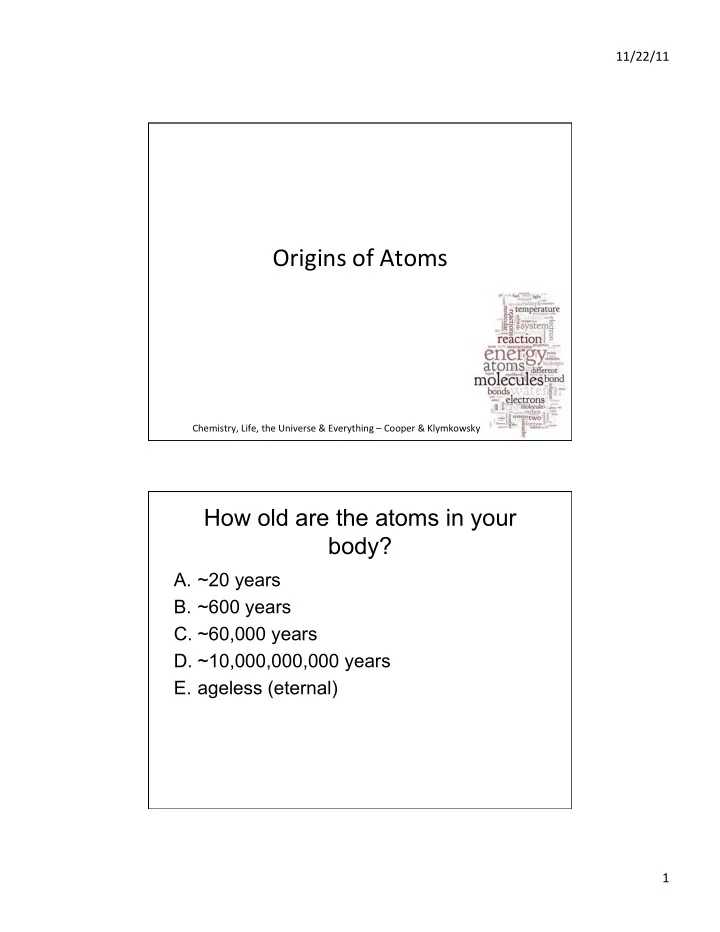

11/22/11 ¡ Origins ¡of ¡Atoms ¡ Chemistry, ¡Life, ¡the ¡Universe ¡& ¡Everything ¡– ¡Cooper ¡& ¡Klymkowsky ¡ How old are the atoms in your body? A. ~20 years B. ~600 years C. ~60,000 years D. ~10,000,000,000 years E. ageless (eternal) 1 ¡
11/22/11 ¡ Where ¡do ¡atoms ¡ come ¡from? ¡ • In ¡the ¡beginning ¡….. ¡ • Big ¡Bang ¡ – 13.73 ¡Billion ¡years ¡ago ¡– ¡ ¡ – Singularity ¡ ¡ – 1 ¡pico ¡second ¡aNer ¡ ¡-‑ ¡no ¡only ¡leptons ¡(quarks, ¡electrons) ¡ – 1 ¡micro ¡second ¡– ¡protons ¡and ¡neutrons ¡ – Few ¡minutes ¡– ¡H + ¡D + ¡ He 2+ ¡Li 3+ ¡ ¡(density ¡of ¡air) ¡ – For ¡400K ¡years ¡temp ¡dropped ¡– ¡no ¡further ¡fusion ¡ – the ¡big ¡bang ¡ – Before ¡the ¡Big ¡Bang ¡ – hYp://science.nasa.gov/astrophysics/focus-‑areas/what-‑ powered-‑the-‑big-‑bang/ ¡ 2 ¡
11/22/11 ¡ How ¡do ¡we ¡know? ¡ • Universe ¡is ¡expanding ¡(red ¡shiN) ¡ • Computer ¡Models ¡ • CMBR ¡(Cosmic ¡background ¡microwave ¡ radia^on) ¡ – 1.9mm ¡(microwave) ¡– ¡relic ¡of ¡early ¡universe ¡that ¡ was ¡a ¡plasma ¡of ¡protons ¡ ¡ Background ¡radia^on ¡from ¡380,000 ¡ yrs ¡aNer ¡the ¡big ¡bang ¡ 3 ¡
11/22/11 ¡ A ¡billion ¡years ¡later ¡ • Clumping ¡(universe ¡is ¡not ¡ homogeneous) ¡ • Gravita^onal ¡aYrac^on ¡– ¡raised ¡ temperature ¡ • Fusion ¡restarted ¡ • Stars ¡formed ¡ ¡ • Hydrogen ¡burning ¡ ¡ – 4 ¡ 1 H + ¡-‑> ¡ 4 He 2+ ¡ ¡+ ¡2e + ¡+ ¡energy ¡ • Helium ¡burning ¡ ¡ – 3 ¡ 4 He 2+ ¡ ¡-‑> ¡ ¡ 12 C 6+ ¡+ ¡(lots ¡of) ¡energy ¡ Solar ¡system ¡ • 3 rd ¡genera^on ¡star ¡ • Forma^on ¡triggered ¡by ¡shockwave ¡from ¡a ¡ supernova ¡“nearby” ¡ • Sun ¡contains ¡heavy ¡elements ¡not ¡found ¡in ¡1 st ¡ genera^on ¡ • Earth ¡-‑ ¡4.5 ¡billion ¡years ¡-‑ ¡accreted ¡from ¡proto-‑ star ¡disc ¡ • “We ¡are ¡stardust” ¡ 4 ¡
11/22/11 ¡ Nuclear Reactions • Involve nucleus (not electrons) • Often result in change in element (since element is defined by the number of protons) Chemical Reactions • Involve rearrangements (sharing, donating or accepting) of valence electrons • The element undergoing a chemical reaction does not change (EVER) 5 ¡
11/22/11 ¡ Nuclear ¡reac^ons ¡ • Fusion ¡(adding ¡two ¡nuclei ¡together) ¡ • Fission ¡(breaking ¡apart) ¡ • Decay ¡(emihng ¡par^cles, ¡α, ¡β, ¡γ ¡etc) ¡ The Atomic number defines the element 6 ¡
11/22/11 ¡ Isotopes have same # protons and a different # of neutrons Which is an isotope of 12 C? A. 13 C B. 12 N C. 12 Mg How ¡many ¡protons ¡and ¡neutrons ¡does ¡ 12 N ¡have? ¡ A. 6p, ¡6n ¡ B. 7p, ¡5n ¡ C. 5p, ¡7n ¡ D. 7p, ¡7n ¡ Fusion ¡ At ¡close ¡range ¡there ¡is ¡a ¡ strong ¡repulsion ¡between ¡ the ¡nuclei. ¡ ¡ ¡ It ¡must ¡be ¡overcome ¡by ¡ adding ¡energy ¡to ¡the ¡ system. ¡ ¡ When ¡nuclei ¡get ¡close ¡ enough ¡they ¡fuse ¡together ¡ – ¡and ¡release ¡energy ¡ (E=mc 2 ) ¡ 7 ¡
11/22/11 ¡ Repulsion ¡increases ¡ energy ¡required ¡to ¡cause ¡ fusion ¡ Barrier ¡to ¡fusion ¡is ¡ high ¡(electrosta^c) ¡ ¡ If ¡nuclei ¡can ¡get ¡close ¡ enough ¡the ¡strong ¡ nuclear ¡force ¡can ¡ come ¡into ¡play ¡(only ¡ at ¡distances ¡of ¡about ¡ one ¡nucleon ¡– ¡proton ¡ or ¡neutron) ¡ Fusion ¡ Hydrogen ¡burning ¡ ¡ 4 ¡ 1 H + ¡-‑> ¡ 4 He 2+ ¡ ¡+ ¡2e + ¡+ ¡energy ¡ ¡ ¡ Helium ¡burning ¡ ¡ 3 ¡ 4 He 2+ ¡ ¡-‑> ¡ ¡ 12 C 6+ ¡+ ¡(lots ¡of) ¡energy ¡ 8 ¡
11/22/11 ¡ Stable nuclei • Typically # neutrons (N) > # protons (P) for heavier elements (strong nuclear force overcomes p+ ↔ p+ repulsion) • Have “ magic numbers ” of nucleons (P or N or both) – 2, 8, 20, 28, 50, 82, 126 • Have < 92 protons Why do some nuclei decay? 9 ¡
11/22/11 ¡ Nuclear reactions and energy changes • Nuclear reactions are accompanied by changes in mass! • Mass-energy equivalence • E=mc 2 Energy Changes/per nucleon Fusion ¡can ¡ Fission ¡here ¡– ¡nuclei ¡ occur ¡here ¡– ¡ break ¡apart ¡to ¡form ¡ light ¡nuclei ¡ more ¡stable ¡lighter ¡ become ¡more ¡ elements ¡ stable ¡when ¡ fused ¡together ¡ (more ¡binding ¡ energy) ¡ 10 ¡
11/22/11 ¡ Nuclear Fission • Nuclear Fission is the fragmentation of heavy nuclei to form lighter, more stable ones. 11 ¡
Recommend
More recommend